Shevlin Sebastian's Blog, page 19
January 27, 2022
Toddy: the fading elixir?


As the Kerala State Government plans to set up of a Toddy Corporation, to revive the sector, stakeholders wait for further details
Photos: The Mullapanthal Toddy shop; glass of toddy
By Shevlin Sebastian
There are several Formica-topped tables with red plastic chairs inside the Mullapanthal Toddy shop, in Tripunithura, a suburb of Kochi. The fans hang down from long rods. On most tables there is a brown earthenware pot which contains toddy. As expected, the aroma is that of masala and spices. Through the large grilled windows, you can see the road outside. Buses, cars and auto-rickshaws whiz past, their horns blaring.
The crowd on this weekday afternoon is decent when you consider that an Omicron pandemic is raging in the state. There are families, a group of girls and a few men, who are sipping down the white-coloured toddy. Many are having tapioca with fish. Other items on the menu include squid, duck, chicken, prawns, beef, and crabs.
The mood is upbeat but not so for owner Vijaykumar, 55, who has been running this shop for the past 35 years. “The sale of toddy has been going down,” he said. “Yesterday, I only sold 100 litres of toddy. People come now mostly for the food.”
Vijaykumar gave away 26 shops for the workers to run, because he could not make a profit. Now he only runs three shops.
One major reason is that many bars have sprung up in the vicinity. When he started out, there were only three bars in a 15-km radius at Tripunithura. “Now there are 20 bars,” says Vijaykumar. “Most people prefer to go to bars, because you get a high much faster with whisky, beer and brandy. In my experience, as soon as a bar comes up near a toddy shop, it immediately experiences losses and has to shut down.”
In the nearby town of Mulanthuruthy, Vijaykumar was running a toddy shop and had sales of 300 litres a day. When a bar and two outlets of the government-run Kerala State Beverages Corporation opened, the daily sales at his shop fell drastically.
His labour expenses are high. At his Mullapanthal Toddy shop, Vijaykumar has 27 people on his payroll. They include 14 women in the kitchen, apart from servers and cleaners. “But nowadays, I call up the entire staff only on weekends,” he said. “That’s when we have good business.”
Meanwhile, the State government has announced that it has plans to set up a Toddy Corporation. The corporation will regulate the functioning of the 5000-odd toddy shops. It will buy and distribute toddy. The corporation also has plans to hand over the shops to workers’ cooperatives.
Asked about this initiative by the state government, Vijaykumar says that he has not yet heard the details of what they are planning to do. “My concern is whether I will be able to buy the toddy as I do now,” he said. “Will there be too much bureaucracy that will slow down the process?”
Another problem is that landlords are reluctant to rent out premises to toddy shops. “The people in the locality will object,” said Vijaykumar. “I hope the state government can solve this problem.”
Asked about the clientele for toddy, he said they ranged in age from the mid-thirties to the sixties. “Many of them are locals,” he said. “There are labourers, transport drivers, and office workers.”
KP Murali is the secretary of the Tripunithura branch of the Toddy Workers Union. It belongs to the Centre of Indian Trade Unions. He said that he had read newspaper reports about a Toddy Corporation, but the union had received no details of the policy. “I cannot comment unless I can read a draft,” he said.
Like Vijaykumar, he admitted the sale of toddy has been declining. “One of the main reasons is that people are opting for other drinks because the kick is much faster,” he said. “The younger generation prefers drugs like heroin and marijuana. These youngsters want an instant high. That is not possible by drinking toddy. It takes time for the kick to happen. But the youth are impatient.”
Asked about the clientele, Murali says, “They are mostly old people who belong to a different generation.”
The daily wages for a worker in a toddy shop are Rs 470. This has remained static for the past four years. “Without a steady income, the owners cannot raise salaries,” he said.
Murali paused and said, “The future does not look rosy.”
(Published in News9Live.com)
January 17, 2022
What's in a name?
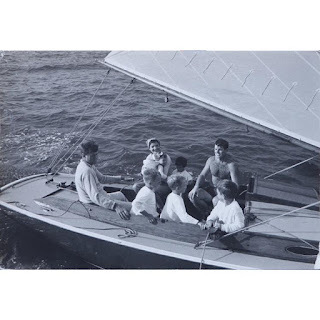
 Photo: President John F Kennedy with his family sailing in the Nantucket Sound
Photo: President John F Kennedy with his family sailing in the Nantucket SoundBy Shevlin Sebastian
A former colleague asked me the other day, ‘How did you get the name Shevlin?”
This is the first time somebody has asked me that question.
I have spent a lot of time, over the years, thinking about my unusual name.
So I asked my mother about it.
She said my father had named the eldest child; so he said it would be her turn to name me.
Since my sister was born in June, my father decided to call her June.
But my mother wanted to give me a unique name. When she was pregnant with me, she came across a photo feature in Life Magazine of American President John F Kennedy and his relatives and friends swimming and sailing on the Nantucket Sound, near Hyannis Port, Massachusetts.
When she read one caption, she noticed that one of Kennedy’s relatives or friends had the name of Shevlin. The name struck her. She liked the sound of it. She felt this would be a unique name. It is of Irish origin. And that is how I ended up with it.
I like this name. And I like it when paired with my surname Sebastian. There is a rhythm and symmetry to it, with the two ‘S’s, especially when you see it in print.
But early in my career, I realised people could misunderstand the name. When I was working in Sportsworld magazine, I would get letters addressed to ‘Miss Shevlin’. That’s when I realised it is difficult to identify the gender of a person when reading my first name.
One reader wrote, ‘Apart from your beautiful writing, I am sure you look beautiful, too.’
I had to quickly type out a reply informing him I had to disappoint him and that I am, unfortunately, a male. This was the era when we used typewriters. There was no social media or Google where we could type the name of a person and get biographical information about him or her. I didn’t get a reply from this letter-writer. He must have been shocked into silence.
In Kerala, where I have lived for the past several years, it is almost impossible for most people, especially strangers, to call me Shevlin. Instead, they always call me Shelvin. It has happened so many times that I no longer correct people. Some acquaintances have been calling me Shelvin for years.
I noticed that a certain group of people — government, corporation and hospital clerks, plumbers, carpenters and electricians — find it difficult to pronounce my name. So, I opted for the easier and more common name of Sebastian.
Sometimes, people have advised me not to use my name. Once a senior colleague suggested to me, I used a pseudonym when writing erotic stories. “This will damage your image,” he said. But I declined by saying that I was proud of my name and I did not feel any shame in writing erotica.
Of course, unlike in America, children don’t call their parents by name in India or across Asia. So, my children call me ‘Baba’. This is a tribute to my roots, as I consider myself half-Bengali, having been born and brought up in Calcutta.
So, thank you, Mom!
Despite all the niggling issues, I love my name and I loved the creative way you selected this name.
January 8, 2022
The arduous task of upholding justice

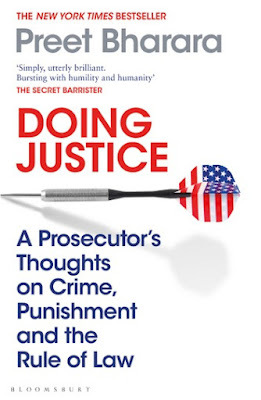
Former US District Attorney Preet Bharara’s book, ‘Doing Justice – A prosecutor’s thoughts on crime, punishment and the rule of law’ is an eye-opener for ordinary readers and a must-read for those in law enforcement
By Shevlin Sebastian
On March 11, 2004, terrorists blew up four passenger trains in Madrid. 196 people died. 2000 suffered from a devastating injury. After an intensive search, the Spanish National Police (SNP) found a blue plastic bag inside an abandoned van. This contained seven copper detonators. There were two fingerprints on it. These did not match any in the SNP database. They sent the images to Interpol, which forwarded them to the Federal Bureau of Investigation (FBI) in the US. Three fingerprint experts, one after the other, matched it to a single individual.
His name was Brandon Mayfield. He had married a Muslim from Egypt. Following the marriage, Brandon had also converted to Islam. He attended a mosque in Beaverton, Oregon; this was under investigation by the local authorities.
As a lawyer, Mayfield had represented a terrorist, who was convicted of providing material support to Al-Qaeda and the Taliban. On May 6, 2004, the FBI took Mayfield into custody, but he protested his innocence.
The SNP also did not accept the finding. Following their investigations, they said the fingerprints matched that of an Algerian national, Ouhnane Daoud. Later, the SNP charged him with 191 counts of murder. The FBI had made a mistake. They conducted an internal investigation. The conclusion: the initial examiner, a senior and experienced forensic investigator, had made an error. The others agreed with him, without doing a vigorous check. Thereafter, the state exonerated Brandon and paid a compensation of $2 million.
Mistakes happen all the time in police investigations. As a result, people have spent decades in jail accused of crimes they have not committed. If this happens in the most sophisticated country in the world, with the most advanced technology, you can imagine the situation in other countries.
Indian-born United States Attorney Preet Bharara recounted this anecdote in his book, ‘Doing Justice — A prosecutor’s thoughts on crime, punishment and the rule of law’.
Some of the chapter headings include, ‘The Truth is Elusive’, ‘Things are not what they seem’, ‘The Need for Rigour’, ‘Curiosity and Query’, and the ‘Principles of Interrogation’.
On the cover, there is a blurb attributed to ‘The Secret Barrister’, which describes the book as ‘bursting with humility and humanity.’
This is true. This is what Preet writes about prisons: ‘Prisons and jails are crucibles of dehumanisation. The very dynamic of a prison rationalises and rewards subjugation. There are many ways to dehumanise people in prison. There is the complete stripping away of privacy; the drab identical uniforms and identification by number, and the en masse herding to meals.
‘The road to hell is paved with laziness. Punitiveness doesn’t require brainpower. Force is easy; restraint is hard. Someone resists. He gets a fist to the head. Someone violates, he gets solitary. It is easy to deal with most problems with brute force.’
One of the most interesting stories is that of the Luftwaffe investigator, Hanns Scharff. As Preet wrote: ‘He became known as the slyest and most effective stealer of secrets in Germany. His style was gentle, his manner soft. He posed as every captured pilot’s greatest ally and advocate. He fed them and he joked with them. Scharff famously took nature walks with his POWs, who strolled unrestrained, as long as they promised they would not try to escape. He relied on trust and intellect and took advantage of their human need for contact and kinship. And POW after POW dropped his guard with such frequency that Scharff became the stuff of legend throughout the Luftwaffe.’
This was in stark contrast to the Gestapo, which always used harsh interrogation methods. As Scharff said, “Soft words do more than hard blows.” Or, as Preet said, “Strategy beats savagery and patience outperforms force.”
After the war, Scharff migrated to America and settled in California. The US Air Force invited Scharff to give speeches to military audiences about his methods. They incorporated most of his techniques into the military curriculum.
But Scharff did not bask in his achievements. Since he had studied textile design as a young man, Scharff became a mosaic artist and had a highly successful career. His art was seen all over the world and he was much respected. Scharff, who never married, died on September 10, 1992, at 84. To know more, you can read the book, ‘The Interrogator: The Story of Hanns Scharff, Master Interrogator of the Luftwaffe’ by Raymond F Toliver.
As for Preet’s book, it is studded with insights about policing and crime.
Here are a few:
‘Speed is an investigator’s best friend and its worst enemy. Speed is your friend because some evidence evaporates like a puddle in the sun. But undue speed can cause you to overlook evidence or misinterpret it.
An investigator must maintain a near-impossible balance between patience and impatience.
Every conclusion must be subject to challenge and revision. This is hard because human beings have egos. That stubbornness can cause tremendous injustice.
Self-doubt in moderation is animating and motivating, not paralysing. Leaders who have purged themselves of all self-doubt will not be leaders for long and dangerous while in command. I learned over time that self-doubt was my friend and arrogance, my enemy.
You can always find that bit of humanity inside a criminal if you look hard enough. Find that moment of connection, not that lever of fear.’
Overall, Preet’s book is a must-read for those in law enforcement. This is more so in India, where third-degree methods are the go-to method, to extract information of any kind. However, most information gleaned this way ends up becoming unreliable. As a result, many offences remain unresolved. So, the police adopt the easy way out: they charge innocent people with the crime.
December 26, 2021
How the mighty were humbled
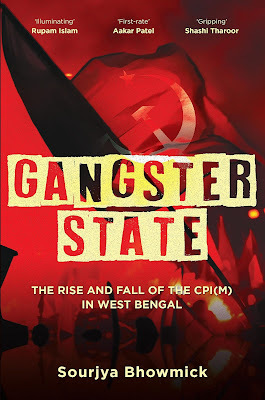
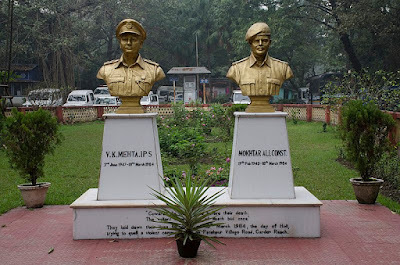
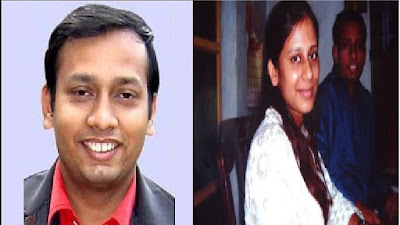
Pics: The book cover; the busts of VK Mehta and Mokhtar Ali outside the office of the Port Division; Rizwanur Rehman and Priyanka Todi
Journalist Sourjya Bhowmick’s book, ‘Gangster State - The rise and fall of the CPI(M) in West Bengal’, gives a feel of what life was like during the three decades of Communist rule
By Shevlin Sebastian
During my childhood and teenage years, I grew up in a cosmopolitan locality in Calcutta. So we lived amongst Gujaratis, Marwaris, Rajputs, Punjabis, Anglo-Indians, Bengalis, Malayalis, Tamilians, Parsees, and Goans. This cosmopolitanism may be one reason why the Communist Party of India (Marxist) never entered the area, except during elections. In our day-to-day life, we never interacted with the CPI(M) on the street.
Most of us lived in a typical middle-class bubble. Our parents went to work while we attended school. Our entertainment comprised movies, family outings and celebrating major festivals like Durga Puja, Christmas, and New Year. At the end of the year, we went on a vacation. There were no bomb blasts in our area. We did not have youngsters prowling the area, with shirt buttons opened to the navel, sometimes brandishing knives and sickles.
The only moment of tension was during the riots that happened following the December 6, 1992 razing of the Babri Masjid in Ayodhya. There was a rumour that hoodlums would attack our locality. In the end, nothing happened. But we all had to pray hard to the various gods and goddesses that we believed in.
So, it came as a shock when Sourjya Bhowmick, in his book, ‘Gangster State—The rise and fall of the CPI(M) in West Bengal’ confirmed that in most localities, the party had a fearsome presence. They adjudicated between people who had quarrels, took a weekly hafta from shopkeepers, and sometimes they barged into houses and slapped the men in front of their wives and children.
To double-check whether this happened, I called up a couple of my friends, who confirmed to me that in their localities, the party had a strong presence.
The story is told through Rajat Lahiri. A Presidency College student, he joined the Students Federation of India and became a foot soldier. Later, Rajat became a full-fledged party member.
The style is novelistic, fast-paced and gripping.
There were no surprises to read that during elections, the party used intimidation, violence and rigging. As a result, they remained in power for seven consecutive five-year terms, from 1977 to 2011. Sourjya wrote about several incidents which ignited in me memories of those times.
One was the brutal murder, on March 18, 1984, of Vinod Kumar Mehta, 35, who was a Deputy Commissioner of Police of the Port Division. His bodyguard, constable Mokhtar Ali, was also killed.
Mehta entered a narrow bylane in Garden Reach to search for criminals. At that moment, some hoodlums stepped forward and stabbed him. He died soon after. The reason: Mehta did not condone any of the illegal activities taking place in the Port area. A minister, who allegedly had links with the criminal elements at the port, stood accused of the murder. But Kalimuddin Shams, a member of the Forward Bloc and the Deputy Speaker of the Assembly, vociferously denied his involvement. The case has never been solved. Shams died in 2013 at the age of 74.
Another unsolved case was the death of a 30-year-old graphics instructor, Rizwanur Rahman. At the institute where he worked, he met the 23-year-old Priyanka Todi. They got talking and soon fell in love. They kept this a secret from their families. On August 18, 2007, they also got married in secret, under the Special Marriage Act.
Later, Rizwanur and Priyanka began to live together at his family's modest home. Eventually, the news came to light. However, Priyanka’s father, Ashok Todi, owner of Lux Cozi, a successful innerwear company, opposed the marriage. He contacted the police.
Senior police officers put enormous pressure on Rizwanur and Priyanka to end the marriage. But Rizwanur refused. After prolonged parleys, through intermediaries, the Todi family persuaded Priyanka to spend a week at their home so that they could discuss the matter. Rizwanur extracted a promise that Priyanka would be allowed to return in a week. But she did not return. Rizwanur filed a case.
A week later, on September 21, Rizwanur was found dead beside a railway track. He had a deep wound at the back of his head. Despite this, the Central Bureau of Investigation (CBI) concluded that Rizwanur had committed suicide. The CBI also charged Ashok Todi, with abetment to suicide. Rizwanur’s family refused to accept the findings.
Local media challenged the suicide theory. A driver, who was the first to see the dead body, said his train had not hit Rizwanur.
Today, Priyanka is involved in her father’s business, which has a sales turnover of Rs 1900 crore in March, 2021. Browsing online, I couldn’t find out whether or not Priyanka had married again.
Author Sourjya also wrote about the farmers’ agitation in Singur, 39 kms from Calcutta. The Buddhadev Bhattacharjee government had taken away 970 acres of fertile lands belonging to farmers and gave it to the Tatas so that they could build a factory to manufacture Nano cars. The farmers were unhappy because the compensation was poor.
Mamata Banerjee, the leader of the Opposition, sensed an opportunity. She launched the ‘Save Farmland’ movement. In the end, the government had to back down. Since the Tatas had already started constructing the factory, the local people could not use the spoiled land again for farming for a decade.
‘Gangster State’ also shows how Mamata’s Trinamool Congress became a rising force and decimated the CPI(M) behemoth in 2011.
It was a classic case of David knocking down a Goliath. Not surprisingly, all the hoodlums and CPI(M) party workers, sensing the winds blowing against them, immediately joined the Trinamool. No surprise then that the CPI(M) remains a spent force in Bengal today. The BJP has filled this vacuum in the opposition.
What provides authenticity is that Sourjya, a journalist today, was active as a CPI(M) party member from 2004 to 2011. So, there is a semi-autobiographical feel to the story.
This book is a must-read for those who live in Bengal, those who have left, and for outsiders. It gives a picture of how a party can grow manifold, become a millstone around the necks of the people, and destroy the dreams and aspirations of three generations.
December 22, 2021
The man who shook things up
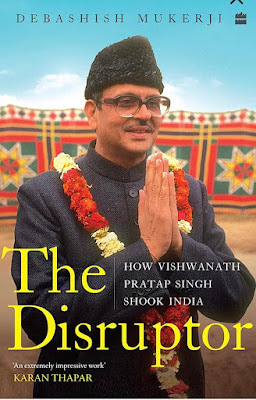
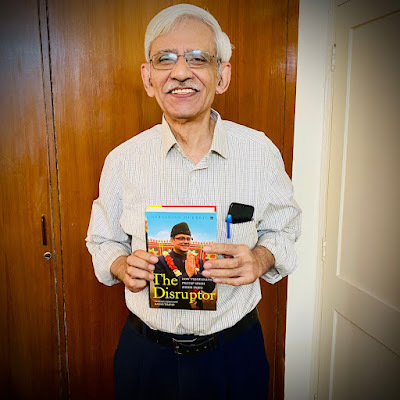
In his absorbing biography, ‘The Disruptor’ – How Vishwanath Pratap Singh shook India’, veteran journalist Debashish Mukerji looks at the life and career of the former Indian Prime Minister
By Shevlin Sebastian
In mid-2000, I used to work on the editorial desk of The Week in Kochi. We used to handle reports and stories sent by about 40 reporters and editors from all over India. It was not an easy job. The quality of the writing was mixed. Sometimes, reports landed late, and we had to work at high speed to edit them, make the pages with the help of the designer before sending them to the press.
Among the writers, the Delhi-based Debashish Mukerji was one of the best. So when a desk hand was assigned a copy of Debashish, he knew there was nothing to be done. A spell check, add the headline and intro and make the page. Debashish’s writing was simple and lucid.
So, it was no surprise when I read his biography of VP Singh, India’s former Prime Minister, called ‘The Disruptor - How Vishwanath Pratap Singh shook India’, it was an absorbing read. What I liked much about the 542-page book was that Debashish focused on the human side, too. So that made the book engaging. We could see things from VP Singh’s point of view.
Politicians, as we all know, rank low on the list of people to admire. They seem to belong to a tribe, who, to win an election, have no qualms of shedding the blood of their countrymen through riots and agitations. Many have blood on their hands but they go through life blithely, always aiming for the next top prize. Nothing fazes them at all. It seems to us the law of karma never catches up with them. Some leaders live on into their nineties smiling at the cameras, while they have left behind the wreckage of thousands of ruined families, whose members have died in various riots. Sometimes, you wonder whether they have a conscience at all.
It was, therefore, surprising when Debashish recounted an incident that took place in 1948. When his elder brother Sant Bux stood for election as president of the Allahabad University students’ union, VP Singh went all out to help him during the campaign. Soon, a rumour spread like a wildfire on the campus that one of Sant Bux’s rivals had spat from a balcony on some girl students sitting below.
Later, VP Singh came to know that this incident had not taken place. But since it played to Sant Bux’s advantage, he kept quiet even though VP Singh aspired to tell the truth all the time. Not surprisingly, Sant Bux won. But decades later, VP Singh, in an interview, said he regretted he kept quiet.
The biography details milestones in VP Singh’s life: implementing the Mandal Commission Report, and as finance minister giving the go-ahead for numerous raids on the biggest business houses of the day, as well as investigating defence deals, when he was defence minister. There is also a focus on the impact of the rath yatra by BJP leader LK Advani, the handling of the kidnapping of home minister Mufti Mohammad Sayeed’s daughter Rubaiyya, and arranging the biggest airlift evacuation in India’s history, of people stranded in Kuwait.
This book feels like an award winner. It won’t be a surprise if it does win a prize for biography next year.
While talking casually to Debashish, he told me it took six years to write the book. “The research took three years, the writing two, and waiting for the book to be published took another year,” he said. “I was not doing this full time as I was also earning a living, which often took up the bulk of the day. Also, I work slowly. There were long gaps during which I did not work on the book at all.”
As for the research, Debashish used a 900-page unpublished transcript of an interview which the Nehru Memorial Museum and Library had conducted with VP Singh. “This transcript is the foundation on which the book rests,” he said. “I also did 30-40 interviews of VP Singh’s friends and acquaintances.”
Debashish also read every single previous book written not only about VP Singh but also about India in the 1960s, 1970s, and the 1980s (about 50-60 of them) along with newspaper archives of the ‘Hindustan Times’ and ‘Indian Express’ of the same decades, plus every issue of ‘India Today’ and ‘Sunday’ from the time they were started, in 1976 up to 1991, plus some parliamentary debate archives.
The research was done either at the Nehru Library or on the net. “VP Singh’s family told me that a chunk of his papers lay dumped at his ancestral home in Manda, but that no one had sifted through them, and I did not either,” said Debashish.
Asked about VP Singh’s qualities as a person, Debashish said, “As a person, he was obsessed with financial integrity. This is very rare for a politician and indeed works to his disadvantage. He was large-hearted and never sought to be vindictive or petty. He was very articulate, had a brilliant mind, was incredible at assimilating information, and understanding issues. All those who interacted with him kept repeating he was a ‘fine gentleman’.”
VP Singh united a fragmented opposition to defeat the Congress, bringing together even the BJP and the Communists, which was an incredible feat. “But such a disparate opposition soon fell apart, so it is a moot question whether he would have done better to build a party of his own which would have taken longer but would have had a solid base,” said Debashish. “Also, he grew as a person and a politician—from blind obeisance to Indira and Sanjay Gandhi to confronting Rajiv Gandhi, growing more and more assertive with experience.”
Regarding his negative attributes, Debashish said, “VP Singh was very suspicious of people. He feared they were misleading him or trying to take advantage of him. He could be very obstinate and indeed ruthless, as seen in the campaign against dacoits in Uttar Pradesh when he spoiled his reputation by allowing fake encounters. He also refused to compromise despite the turmoil created by his decision to implement the Mandal Commission Report.”
Strangely, VP Singh was ambivalent about power. “This is weird for a politician since the entire purpose of politics is to capture power,” said Debashish. “He wanted power, but did not want to be seen as ambitious or seeking it. He was obsessed with his image, caring very much about what others thought of him.”
A loner since his childhood, it is no surprise to know he was not a warm person. Journalists covering him told Debashish that even after doing the beat for years, they were no closer to him than when they began.
Interestingly, few people will know this, but VP Singh contributed to the rise of the BJP. In the 1984 Lok Sabha election, said Debashish, the BJP had two seats; in the 1989 election, when it allied with VP Singh’s Janata Dal, it won 85 seats. Thereafter its advance became unstoppable—120 seats in the 1991 election, 161 seats in the 1996 election and finally 182 seats in the 1998 election after which it could form the government at the Centre for the first time, with the help of allies.
“So the tie-up with VP Singh, when he was at the height of his popularity, helped the BJP,” said Debashish. “In his defence, it can be said that the pre-Babri Masjid demolition BJP had a very different image from the post-demolition BJP. Before December 6, 1992, the BJP and its earlier incarnation, the Jana Sangh, used to be part of all opposition attempts to oust the Congress from power; no one realised what BJP would one day be capable of. And of course, VP Singh did stand up to the BJP over the Babri Masjid issue, losing his government as a result when the BJP withdrew support.
Asked about an anecdote that he found fascinating, Debashish said, “Uma Shanker Dikshit (the late Delhi Chief Minister Sheila Dikshit’s father-in-law) visited VP Singh on Rajiv Gandhi’s behalf and tried to patch up things between the two. He was in his late eighties then, arthritic and leaning heavily on his walking stick. VP Singh had quit after ordering an investigation into the defence deal to buy four submarines from the West German firm HDW, in which, he had been informed, illegal commissions were paid.”
He ordered the probe without consulting Rajiv, who was furious—the implication being that Rajiv himself was involved in the deal. Dikshit told him, “I’m sure Rajiv Gandhi isn’t neck-deep in the HDW payoff. But he is nose-deep. What else did you expect? Black money is as crucial to the functioning of a political party as this walking stick is to me. Without this walking stick, I can’t even go to the bathroom. You were trying to take away Rajiv Gandhi’s walking stick.”
VP Singh’s reply to the Nehru Library interviewer: “There was nothing I could say to that, except to insist that political funding should be transparent.”
December 14, 2021
Life in God’s Own Country
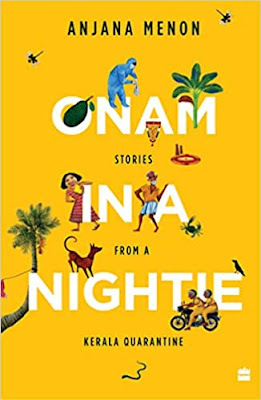

Anjana Menon has written a charming book about her experiences in Kerala
By Shevlin Sebastian
Kerala may be the only place in the world where the nightgown (or nightie, in short) is used as a public garment. So, you will see women in their nighties at grocery shops, in fish and vegetable markets, in religious places, inside ATM counters and even at vaccination centres.
So, how did this garment, worn at home and usually in the bedroom, become the dress of choice to wear outside?
There are no clear-cut answers, although author Anjana Menon in her non-fiction book, ‘Onam in a nightie—Stories in a Kerala Quarantine’ makes an attempt. She writes, ‘The heat that builds at the top of the chest escapes effortlessly from the bottom of the dress. It’s the dress of ventilation gifted to the Kerala woman.’
As I read this, I felt the traditional attire of paavada and blouse, such a sensual dress, would have provided far better ventilation. So, this remains a mystery.
Unlike in the West, where a nightie might mean a plunging cleavage and skimming the thighs, the Kerala nightie begins from the neck and goes to the floor, covering every bit of skin along the way. All we can see is the woman’s face and the area from the elbows to the fingers. Or, as Anjana put it, ‘Seduction is impossible in this garment. It destroys the shape of the shapeliest of women.’ Men have no option but to curse the tailors who make these tents.
This is a charming book. Written in a simple style, the book is divided into two parts. The Delhi-based Anjana had come to Thrissur, in July, 2020, to spend a couple of months with her parents during the COVID-19 pandemic. In the end, she stayed for seven months.
So, the first part is about her experiences during the quarantine: the friendly cop and health worker enquiring whether she remains in good health, and her experiences having different dishes, which her mother conjures up. She talks about driving in Kerala and going to the beach to get a breather from all the tension.
Anjana has an original descriptive style. To describe the impact of high humidity, Anjana writes, ‘water in the air oppressing the water in our bodies’. I learnt a new word: lurgy. It means an illness or disease, especially one that is not serious.
The second part of the book is about the unique characters she meets. Like Shivankutty, the labourer who works in their garden, and Mariamma, who had worked in Anjana’s house in Delhi and is now a government worker in Kerala. And she writes with insight about her parents who lived and worked in Delhi for decades.
‘Kerala is full of retirees like them. People who emigrated to big cities when they were young, worked hard and gave their children a good life. Once they return to their ‘native place’, the friends of their youth, the familiarity of the neighbourhood they spent their middle age in, the relationships of the city they thrived in, are all left behind. The voids are too many to fill.
‘I see it around me every day, in the multitudes of aunts and uncles whose children live in another city, mostly another country that is thousands of miles away, chasing their own life and building their future.’
But it is not only loneliness that these parents suffer from.
Sometimes, it is ill health. As Anjana writes, ‘They are the living dead, fed up with being sick, waiting to die and yet hoping that when they do, their children will be at their side.’
Anjana also writes about the impact of alcoholism, which afflicts a majority of the men. ‘Alcohol hangs in the narrow lanes of the villages, on the face of distraught families, along footpaths where the drunks lie, and in the serpentine queues at toddy shops. It piles up as household debt, violence against women and destitution. You don’t have to look much to find it. It’s everywhere, thriving between resistance and a resigned acceptance.’
Anjana, a former journalist who now runs a Delhi-based content strategy consultancy, had also lived in London and Singapore. So, she makes thought-provoking comparisons between these cities and Thrissur. This book will appeal to all those who are curious about Kerala, and to the children of the lakhs of Non-Resident Malayalis who live in West Asia and North America. They will read and find validation of their experiences.
Like Anjana, they come once every one or two years to spend time with their grandparents and get a feel of their roots. This book will also appeal to those who have come to Kerala for a holiday. They will get an understanding of the inner life of Malayalis.
Finally, a note about the illustrations. Anujath Sindhu Vinaylal, 16, has done the illustrations. An award-winning artist, since the age of 12, he lost his 42-year-old mother to a heart ailment in 2019. But he continues to work hard. His illustrations are simple, yet eye-catching. What is remarkable is that the people drawn seem to emanate emotions. It is imperative for the elders to nurture this talent. One of the founders of the Kochi Biennale, Bose Krishnamachari, with his extensive contacts, can help Anujath make a mark at the international level.
December 11, 2021
Excavating a dream

Everybody dreams at night. But we are unable to recall 99 percent of our dreams. But on a recent morning, I saw a black-and-white illustration of a man in a conical hat standing on a road, with the sky jet black and snowflakes falling steadily.
Intrigued, I decided to enter the image.
This is what I saw.
A Christmas Story….with a difference
By Shevlin Sebastian
The sky was pitch black. Against this backdrop, snowflakes floated down to the earth. It looked like tiny paper boats bobbing along in the water. On both sides of the road were one and two-storeyed buildings covered with snow. The gardens in front were all under this thick layer of snow.
It was 2 am on Christmas Day. The people were indoors and sleeping. The previous evening, the weather bulletins on TV had announced an intense blizzard and asked the people to stay indoors on this celebratory night.
The street lights let off a dim glow, as the snow covered the plastic encasing. A man stood, his legs spread apart on the road. His name was Rudy Martin. He wore a long conical hat and a large overhanging coat. As he walked in his black knee-length boots, the snow crunched under his feet. Rudy could feel the faint odour of fish. He wondered where it came from. Then he realised it was from his coat pocket.
Rudy walked forward and turned right into another broad street. It was dark and silent. But in the distance, he saw something flying about, over and around in the air. When he came closer, Rudy saw they were green elves with their red Santa caps and pointed shoes. They were laughing and doing high-fives with each other. Their laughs sounded like the ‘crick crick’ of the crickets to Rudy.
Soon, a lady with white hair and leather sandals came forward, holding a large cauldron in both her hands. Inside it was a long ladle. A large leather bag hung from her shoulders. She stood in the middle, and put the vessel on the ground, as the elves continued to fly about.
Marissa Witch took out a wand from the pocket of her large red skirt and touched the side of the pot. A fire started under the cauldron.
Marissa bent and collected chunks of snow in her palms and put it into the cauldron. From her bag, she took out medium-size plastic packets, tore open the top edge, and poured the powders into the vessel. Thereafter, she put in nettles, grass, plants, and seaweed, followed by dead earthworms, spiders, lizards, flies, bees and centipedes.
She stirred the contents with the ladle. Plumes of smoke rose from the pot as it got hotter. A few minutes went by. Marissa lifted the ladle to her mouth and took a sip. She smacked her lips together.
Marissa took small white cups from her bag and filled them with the hot liquid. The elves stood in a queue in the air and took the cups one by one. They drank the liquid in one gulp. The elves licked their lips, laughed, and flew down and put the cups inside a plastic waste packet.
Intrigued by what he saw, Rudy came closer, even though he pressed his tongue to the roof of his mouth. He was not sure about what would happen if the witch and the elves saw him. But as he came closer, he found there was nothing there — just a wide expanse of snow in the darkness. ‘Did it happen?’ he scratched his head.
As Rudy stood looking around, he heard a thumping sound. It sounded like a drumbeat, or maybe, he thought, it could be his heartbeat. He was not sure. But soon, he saw an animal bounding towards him with long and smooth strides. It looked like a cross between a hound and a wolf. It surprised Rudy the animal could run so well on a surface covered with snow.
The animal was at least 4 feet in height. It had two canine teeth protruding from his mouth. Rudy took out a blood-stained knife from his coat pocket. It gave off the fishlike odour which he had detected earlier.
He crouched and waited.
It was clear the animal intended to attack him.
Rudy heard an ear-splitting “Wooaah”. The animal pushed his forelimbs hard on the ground, but it took several inches for it to come to a stop. It looked back.
Santa Claus, a vision in red, stood on his sledge, and cracked his whip. It sounded like a whiplash. The eight reindeer, four on each side, led by Rudolph the Red-Nose, hit their hooves harder on the ground to increase the speed of the sledge.
Santa shouted, “Get lost.”
The animal blinked as drops of saliva fell from its tongue. It swallowed its spittle, moved past Rudy, and sped into the darkness. Rudy put the knife back in his coat.
The sledge came to a stop near Rudy as he put the knife back in.
“Hello Sir, how are you?” said Santa Claus, gazing at Rudy. “Would you care for a lift?”
Rudy nodded. He wanted to get as far away from the town as soon as possible.
So, he sat beside Santa.
The sledge moved on. After five minutes, they stopped in front of a house. The house was in darkness. Santa took out a parcel, covered in shiny purple paper, with a bow, from a large gunny sack behind his seat. He pushed open the iron gate and walked as if on tiptoe down the courtyard. Santa placed the gift on the floor in front of the door.
When he returned, he told Rudy, “The poor boy suffers from cerebral palsy.”
Rudy nodded.
They made a few more stops.
Rudy asked, “When will you be leaving for the next town?
“Soon,” said Santa Claus and smiled.
Rudy observed he had yellow teeth. He wondered about it.
Santa read his mind and said, “I had jaundice recently.”
Rudy started, his body leaning forward, and looked sideways at Santa.
Santa nodded, smiled and said, “I can read minds.”
Rudy bit his lower lip.
Rudy thought, ‘How can you get yellow teeth through jaundice? Only your skin or eyes change colour.’
“The teeth of Santas do,” said the burly man.
Rudy said, “Do you know anything about me?”
Santa looked at him without blinking and nodded.
“I do,” he said finally. “Your name is Rudy Martin. You have stabbed your girlfriend to death, and she lies on the carpet in the drawing-room in a house in this town. You have stolen all her gold and silver jewellery. You are escaping. The murder weapon is in your coat pocket.”
A tremor ran through Rudy’s body even as the sledge rose in the air, along with the reindeer, and headed towards the sky.
Santa Claus was going to the next town.
Santa continued, even as they passed through the clouds, “This is your fifth murder. Your modus operandi is simple. You go to a new town and befriend a wealthy but lonely spinster. You pretend you are in love, gain entrance to their homes, kill them and take all their valuables.”
Rudy almost felt his heart seize up. He could not help but think, ‘How did this man know this?’
“We know everything,” said Santa. “We are spiritual beings. The Universal Energy has chosen us to do this job because of this quality.”
Santa added, with a twinkle in his eyes, “That does not mean we cannot get jaundice.”
Rudy was in no mood to enjoy the joke. He did not know what Santa was planning to do with him. He knew he had to do something drastic, but he did not know what. It was impossible to do anything without having a thought first.
The sledge carried on, going deeper and deeper into the darkness.
Rudy was trembling in the freezing temperature. His teeth chattered. He pressed his hands and legs together. He bent his head towards his knees. He glanced at Santa.
This particular Santa had thick arms and muscular thighs, and large feet. Rudy realised Santa was not a pushover. He was not like the spinsters he had killed, with an easy slitting of the throat. There was no sound — only blood spurting out from the carotid artery and rolling down the back of his hand towards the floor.
Rudy opened his mouth wide. In the rarefied atmosphere, he was finding it difficult to breathe. He took several lungfuls of breath. Santa watched silently. Then he reached out and touched Rudy’s arm. Immediately, Rudy felt normal. He did not have any breathing problems, nor did he feel cold.
Santa said, “I know you are a foster child. Your parents died early. You lived in many orphanages. I know some wardens molested you. I know you developed a rage. I can see in my mind’s eye you have molested many girls. In their childhood, many people have been molested. But none chose to be murderers, like you. Rudy, you chose evil over good. You chose harm against kindness. You went into the darkness rather than the light. Remember, Rudy, you made the choice.”
Rudy did not know what to reply. He knew Santa was right. Life was all about choices. And he chose the side which fuelled his rage rather than calm it.
They were silent for several moments.
Then Santa said, “I can see your first kill. Sarah Gorman, aged 48, spinster. Husband died of lung cancer. No children. Life insurance payout was generous. Financially comfortable. Three months of courtship before you slit her throat and took all the jewellery. This was three years ago.”
Rudy realised Santa spelled tremendous danger to him.
A few minutes passed. They went through some dense black clouds.
Rudy could not see Santa.
In a sudden movement, Rudy took the knife out, but Santa caught the wrist immediately. With his other hand, he lifted Rudy by the neck. The cap blew away in this abrupt movement. Santa immediately noticed Rudy’s bald pate. Rudy twisted and turned about, but Santa’s strength was immense. He moved his thumb and pressed it into the carotid artery. Within seconds, Rudy was gasping for breath.
“Your victims could not even gasp for breath,” said Santa. “You were so merciless. A monster.”
Santa grimaced and flung Rudy from the sledge.
Rudy reached out with his hand to hold something, but there was nothing. This action caused him to turn turtle.
A necklace, several bangles and earrings, all made of gold, along with the knife, fell out of Rudy’s pockets.
“You are damned,” shouted Santa. “May you rot in hell.”
Rudy’s screams, as he plummeted towards the earth, could be heard from there…. to eternity.
December 7, 2021
All about AMU
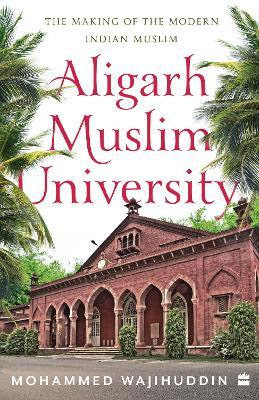
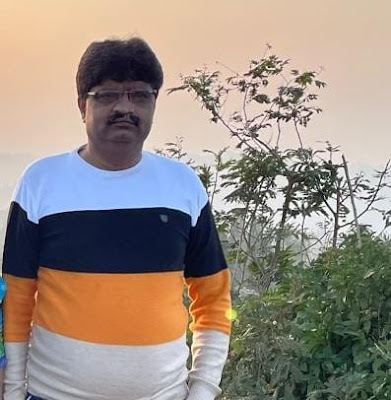
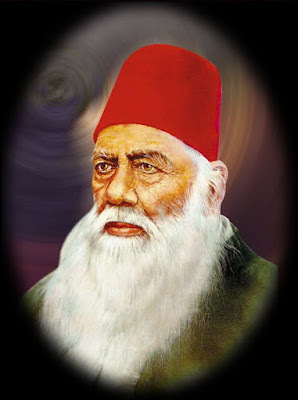
Mohammed Wajihuddin, a failed student of the Aligarh Muslim University, writes an engaging history about the august institution
By Shevlin Sebastian
Photos: The cover; Mohamed Wajihuddin; AMU founder Sir Syed Ahmad Khan (1817-1898)
In the latter half of 1985, Mohammed Wajihuddin came to a depressing conclusion. He had been enrolled in the science stream at the Aligarh Muslim University, where he studied physics, chemistry and biology. But soon, he realised he was not cut out for these subjects or medicine.
Instead, Wajihuddin developed an interest in history, political science and English. He told his father, a schoolteacher, who lived in a village near Darbhanga (Bihar), he wanted to switch streams. He promised to crack the civil service exams and become a member of the Indian Administrative Service (IAS). But his father told him he had a better chance to get an MBBS degree rather than get into the IAS. This caused an intense frustration in Wajihuddin.
He bunked classes and neglected his studies. Wajihuddin spent more time in the Maulana Azad Library, where he voraciously read newspapers and magazines. He devoured the writings of journalists Khushwant Singh, MJ Akbar, Kuldip Nayar, and literary giants like Ghalib, Iqbal and Faiz Ahmed Faiz. All this reading enhanced his English vocabulary. Incidentally, Wajihuddin had studied in a Hindi medium school until Class 10.
Meanwhile, he performed poorly in the exams. This left his father with no option but to take him out of AMU in 1988.
This is what Wajihuddin wrote: ‘I can’t forget the day I reached Aligarh station to board the Magadh Express to Patna. Depressed, ashamed of my poor performance, I cursed myself for not being courageous enough to change my stream from science to arts on my own. Apart from ‘wasting’ three years, I had squandered my father’s hard-earned money. I don’t think I wept as much on the death of my parents as I did on the day I left Aligarh — defeated, desolate, depressed.’
But Wajihuddin was lucky. He could get onto the right path, became a journalist and lived his passion. Today, he is a senior assistant editor in the Mumbai edition of the Times of India.
The trigger to write the book happened when Wajihuddin’s daughters, Nayab, Sara and Zareen, asked him one day, “Daddy, when will you become an author?”
By coincidence, AMU announced its celebratory celebrations in December, 2020. So, Wajihuddin decided to write a book about the institution.
The publisher HarperCollins also sensed a lacunae. Swati Chopra, executive editor, said, “The impact of the Aligarh Muslim University on the making of the modern Indian Muslim is unparalleled and largely undocumented. With this book, we hope to fill the gap at a time when this landmark institution celebrates its hundredth year.”
It is a lucid read. We get a clear picture of the founding of the university, and the tremendous role played by the founder, Sir Syed Ahmad Khan (1817-1898).
Sir Syed, during the foundation stone ceremony, said, “This is the first time in the history of Muhammedans in India that a college owes its establishment not to the charity or love of learning of an individual nor to the splendid patronage of a monarch, but to the combined wishes and the united efforts of a whole community.”
As Wajihuddin writes the history, he does not hesitate to deal with controversial matters like the photo of the founder of Pakistan MA Jinnah, which had been hanging on the walls of the student’s union since 1938.
In May, 2018, Aligarh MP Satish Gautam (BJP) asked why this photo continued to hang on the walls.
Wajihuddin explains that Jinnah had been a member of the university court and, hence, given lifelong membership to the union. They granted this membership before Jinnah’s Muslim League raised the demand for Pakistan.
The other subjects Wajihuddin tackles include the reasons behind why a large number of madrasa students have been admitted into the university. He probes the glorious past as well as the precarious future. He asks and answers whether the AMU is a bastion of liberalism or a hotbed of Islamism.
The university had many illustrated vice-chancellors. Among them was Dr Zakir Hussain, the former President of India. He exhorted the students to work hard. The struggle to ensure the AMU remains an important university is never-ending and energy-sapping.
Dr. Hussain illustrated this with a pithy anecdote.
Once an American millionaire reached Oxford and appreciated a lawn. The millionaire asked, “How much does it cost to create such a lawn?”
The gardener replied, “Sir, it doesn’t cost much. Just a few dollars. I believe you have the land. Just pave it a little and plant the grass in it. When the grass grows a little, run a roller on it. And keep doing that for around five hundred years. You will get a similar lawn.”
Within days of its release, the book has received a thumbs up from readers. It is in 10th place in Amazon's bestsellers’ list in the Colonialism & Imperialism History category. Wajihuddin is closing in on eminent writer William Dalrymple’s ‘The Anarchy: The East India Company, Corporate Violence and Pillage of an Empire’ which is in 6th place.
This is remarkable for a debut author.
November 15, 2021
Nothing rude about this life

(A review of veteran journalist Vir Sanghvi’s memoir, ‘A Rude Life’)
By Shevlin Sebastian
One afternoon, in 2007, Vir Sanghvi, the editorial director of the Hindustan Times, strode into the Mumbai office. He had come straight from the airport following a flight from Delhi. After conversing with the resident editor, he came to the features section, pulled up a chair and requested a sub-editor to open a word file. Then he dictated his column, which would appear the next day. In his dictation, he would also say, ‘Comma’, ‘question mark’, ‘open quote’, ‘close quote’, ‘para’, and ‘full stop’.
Twenty minutes later, the column was finished. Later in the evening, a sub-editor gave Vir the proof of the page where his column had been placed. He made a few changes, using a gel pen, and it was ready to go.
Those of us who watched the afternoon dictation could only watch with envy, this effortless ability. I am not sure I can write anything by dictation. I have to sit and hit the keys. And it takes time to frame thoughts and move from one sentence to another. I cannot get so much clarity in the first draft, as with Vir. I need to work on the copy.
Throughout his career, Vir has written lucid articles. It gripped the reader, as it is mostly about well-known people.
So, no surprises, his just-released memoir, ‘A Rude Life’, is an easy read. I read page after page without a pause. When I looked up from the book, the 61st episode of Season 1 of the hit series, ‘Resurrection: Ertuğrul’, on Netflix, was on freeze-frame at the 21st minute. But Vir could easily keep me away from the twists and turns of the 12th-century fictional story set in Turkey.
Thanks to his father’s time in the Communist Party of India, Vir met notable people from his childhood. The then Defence Minister VK Krishna Menon, a friend of his father, Ramesh, often came to the Sanghvi house for dinner whenever he was in Mumbai. It was Vir’s duty to lead Krishna Menon from the car to the fourth-floor flat.
In November, 1961, Yuri Gagarin, the first astronaut to go to space, came to Mumbai. Ramesh was invited to dinner with the astronaut. Vir wanted to come along. Ramesh agreed. But Ramesh coached his son that the name was Yuri and not Urine, which was how Vir called him.
Throughout his life and career, Vir knew all the notable people so well he had lunch or dinner with them.
Vir became friends with the late Shiv Sena leader Bal Thackeray at the beginning of the latter’s career. And when, after dinner, Thackeray would come to the car to see Vir off, he would sign off by saying ‘Jai Maharashtra’. Vir countered it with ‘Jai Gujarat’. “He would laugh and eventually we reached a compromise, ‘Jai Mumbai,’” wrote Vir.
What became clear soon enough is that all these affluent and powerful personalities went through the same reactions as us normal human beings. They had the same insecurities and inferiority complexes, and ego battles. The only difference was that while our fights affected our family and a few other people, in their tussles, they could affect the destiny of a nation.
What was also clear from reading the book is how having contacts is so important for a successful career, especially in a country like India. Take Vir’s case. His best friend in school was Nikoo Bhullar. Nikoo’s mother Mohini worked for Thomson Press. When the company started ‘India Today’, Mohini asked Vir to write for the magazine. Later, the ‘India Today’ management, through a nudge by Mohini, appointed Vir as the editor of ‘Bombay’ magazine. He was only 22 years old. Later, his father’s friend, RV Pandit, who owned ‘Imprint’ magazine, appointed Vir as editor.
Vir may be one of the few journalists who could cold-call Aveek Sarkar, the owner of the Ananda Bazar Group, asking for a job. The result: he became the editor of ‘Sunday’ magazine at 30. Later, he became editorial director of the Hindustan Times and did many TV shows on various channels and published books too.
Everybody used contacts. Vir recalled that when ‘India Today’ wanted to do a cover story on the famed director Raj Kapoor, who was making the sensual, ‘Satyam Shivam Sundaram’ and remained inaccessible, Vir turned to ‘India Today’ editor Aroon Purie for help. Aroon asked his father, V V Purie, who had financed many of Kapoor’s films to secure the interview. End result: Raj Kapoor spoke to Vir.
Vir’s education was also elitist. He studied at the Mayo College in Ajmer, Mill Hill School, London, and later, at Oxford University.
However, his turning point was a tragedy. When Vir was 15, his father, Ramesh, whom he idolised, died of lung cancer at New York University Medical Centre. On his deathbed, Ramesh told his son, “You are my link with the future. There is enough money. Look after your mother. You will do much better than I could ever do.” It was at that moment Vir realised he could not depend on anybody but himself.
The book is awash with unforgettable anecdotes about the who’s who of Indian society. They include politicians like Sharad Pawar, industrialist KK Birla, actor Dilip Kumar, author Dom Moraes, and director Satyajit Ray. You can plonk down the money to buy the book and remain satisfied.
The book has a striking cover, although it puzzled me about why the designer shifted Vir’s head so much towards the spine that an ear has been cut off. There was enough space on the right to get the full image.
Ah, well, everybody is entitled to his or her creativity.
November 11, 2021
In youth’s lustrous glow, a glance at the future

By Shevlin Sebastian
Most evenings, after I finish my run, I go for a walk to relax my muscles. Frequently, I walk past a group of fifty-odd aspiring nurses, aged between 18-20. They have stepped out of their college hostel to go to the canteen some distance away.
Expectedly, there is a lot of laughter and giggles, high-pitched yelling and teasing jibes. They wear midis, maxis, jeans, trousers, skirts, and, of course, the go-to practical garment for every woman in India: the salwar kameez. All of them wear slippers or flip-flops. And there is always the musky aroma of coconut oil, which they have pressed liberally into their black hair.
When I look at them, I realise they are at the start of their adulthood. Soon, destiny will start making its moves. After their graduation, some will go to the US and Europe. The rumour is that there is a shortfall of nurses in America and Ireland. So, they will try their luck. If some go, they will lift their families, especially post-Covid, when most people are hurting financially.
This step of going abroad will transform their lives. They will become confident and outgoing. Later, most of them will become prized assets in the marriage market. But now, since they have the upper hand, these girls can make choices, and pick the most eligible man.
Some will go to other states in India. Several will work in Kochi and Kerala itself.
What sort of marriage will they have? Again, destiny will play its role. Some will be lucky and have caring husbands. Others may get wife-beaters. There may be husbands who could be alcoholics, drug addicts or womanisers. Some husbands may be lazy and don’t want to go to work. The entire pressure of earning a livelihood will fall on the woman. But there will be some girls who will fall into the lap of luxury because their husbands are business magnates or top-drawer professionals. Or these women may set up nursing homes or hospitals and end up becoming successful entrepreneurs.
Who gets what? It’s a throw of the dice. Who can explain why some have a smooth ride in life, while for others, it is a steep uphill climb on a problem-strewn path. When I look at my friends, some have successful marriages, some have split up, while a few are in agony because they are so unhappy in their marriages but remain unwilling or unable to break up. Some have become widows, losing their husbands early and are struggling to run the family.
How many children will the nurses have? One, two or three. There will be some among them, even though they are nurses, who will find it difficult to conceive. Then they will embark on another type of suffering. The desperate visits to expensive fertility clinics, even as they endure the sarcastic comments by relatives and grandmothers who will poke their stomachs and say, “Is there anything inside?” Bit by bit, the carefree scenes they experienced in their hostel life will become like a faded photograph.
Some will have health issues. They may suffer from a malfunctioning thyroid, diabetes and osteoporosis. An unlucky few may get breast cancer and have to undergo a mastectomy. They will worry if their husbands will lose interest in them and go outside for pleasure.
And what about the loss of looks as they age? How agonising is that? They had prided themselves on their lustrous hair, bright cheeks, thick red lips, and sparkling eyes. Now, life’s repeated blows and sheer ageing will dim it all.
Of course, it is not all darkness and gloom. Many will experience pure happiness. A fulfilling career and harmony in the home. They will have enough money to spend on clothes and good food, go on annual vacations, have a satisfying relationship with their husbands, and be able to send their children to the best schools.
For many parents, children will provide happiness. Parents feel thrilled, especially if their children shine on a national or international stage. Think about the joy of the parents of Neeraj Chopra, India’s first Olympic gold medallist, and PV Sindhu when she was crowned world badminton champion.
But children can cause sorrow. What happens if a child dies in a car accident? That is an agony that will never lessen, despite the passage of time. The whole of Kerala was aghast at the recent car accident in Kochi, where two young girls died at the peak of their youth. What about a child who becomes an alcoholic or drug addict, a criminal or murderer?
But in life, you realise light and darkness are twins. You cannot enjoy one without the other hovering in the background. So, bad times can be followed by good times and vice versa. As these girls went past, I thought about all these things.
It all boils down to your destiny. But we have little control over it or about God’s decisions regarding our lives.
As the noted but controversial film director Woody Allen once said, “If you want to make God laugh, tell Him your plans.”



